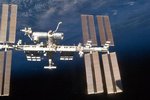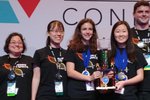Boeing to Host Downlink with ISS Crew Featuring Genes in Space Students and Participating Schools
- ISS astronauts Drew Feustel and Scott Tingle
will take questions from Genes In Space Students
- Facebook Live show to feature research
specialists
- Students to take part on Facebook Live and in
audience
- Thursday, May 10th at 10:30am central time
- Can be viewed on Facebook Live - https://www.facebook.com/jsceducation
HOUSTON, Tx., May 3, 2018 – Boeing [NYSE:BA] will host a televised downlink event with the astronauts aboard the International Space Station (ISS) on May 10 featuring the Genes in Space STEM competition and students who are participating in the research contest. The event will originate from the nonprofit Space Center Houston in Texas and be shown on Facebook Live through NASA’s Johnson Space Center Education Office. The full program will begin at 10:30 a.m. on Facebook Live which can be viewed on https://www.facebook.com/jsceducation. NASA TV will join the downlink portion from 11:05 to 11:25 a.m. The program will wrap up at 11:30 a.m. with a demonstration of Boeing’s Starliner V/R training system.
The astronauts aboard the ISS will take questions from the two students whose experiments recently were conducted aboard the Space Station, plus other contestants and from the audience. About 200 students from Houston area middle and high schools will attend the event.
Guests will include the chief scientist for the ISS, a biologist, a leader of Center for the Advancement of Science in Space (CASIS), and a Starliner engineer. Students will be able to ask questions of all the specialists during the program. Afterward, they will get to experience what flying in the Boeing Starliner will be like courtesy of a virtual reality system Boeing uses to familiarize astronauts with the spacecraft.
Founded by Boeing and miniPCR, the Genes in Space competition offers students in grades 7 through 12 the opportunity to develop DNA-based experiments that could be performed on orbit by astronauts aboard the space station. A panel of scientists evaluates the proposals to select the finalists and then a winner. The contest which has seen five student experiments performed on orbit. Genes in Space sponsors New England Biolabs, Math for America and CASIS also work with students to enable the research to be effectively conducted.
Those taking part in the May 10 program are:
Drew
Feustel, NASA astronaut, International Space Station Expedition 55
Scott Tingle, NASA astronaut, International Space Station Expedition 55
Julie Robinson, NASA chief scientist for the International Space Station
Zeke Alvarez-Saavedra, co-founder, miniPCR
Ken Shields, director of Operations, CASIS
Tony Castilleja, Boeing Starliner
Steven Siceloff, Boeing Communications (Host)
About Boeing’s Role in Human Space Exploration: Boeing is NASA’s prime contractor on the International Space Station program. In addition to designing, building and processing for launch the American modules and the integrated truss system that powers the station, Boeing performs the sustaining engineering. Boeing’s work maintains the station’s role as an orbiting laboratory capable of producing cutting-edge research across numerous scientific disciplines. Boeing processes experiment and systems racks for launch, installation and operation aboard the station. Boeing routinely works with NASA to enhance the station’s capabilities by upgrading subsystems and software to maintain the laboratory’s role as the most advanced human-rated spacecraft ever operated on orbit. Boeing will begin flying astronauts to the station next year aboard the CST-100 Starliner, a spacecraft developed by Boeing in partnership with NASA’s Commercial Crew Program that will give America its first human-rated space transportation vehicle since the retirement of the space shuttles in 2011. Boeing also is building the core stage of NASA’s Space Launch System, a rocket powerful enough to lift astronauts and spacecraft to destinations beyond Earth orbit, such as lunar orbit and Mars. For more information on Boeing, visit www.boeing.com.
About miniPCR: miniPCR was founded in 2013 by Ezequiel “Zeke” Alvarez Saavedra and Sebastian Kraves, graduates of MIT and Harvard respectively, who sought to make access to DNA analysis more accessible. miniPCR’s portable, inexpensive device can replicate specific sections of DNA, in a process called polymerase chain reaction, or PCR. Scientists and doctors use miniPCR each day to accelerate research, diagnose Ebola and other infectious diseases, assess food safety, and to teach essential biotechnology in schools. The Harvard-based team is constantly working to further expand access to hands-on biology. The company partnered with Boeing to co-create the Genes in Space student competition in order to instill the love of science and engineering in the next generation.
Media wishing to cover this event should call or email Steven Siceloff listed below no later than May 9, with the following information on their representative(s) who will attend the event:
- Name
- Affiliation
- Title
- Citizenship - U.S. Citizen (Yes or No)
- Mailing and email addresses
- Contact telephone number
Media representatives covering must present affiliation credentials.
Contact:
Steven
Siceloff
Boeing
– International Space Station
Office:
281-226-4672
Mobile:
281-253-8089
Steven.p.siceloff@boeing.com



